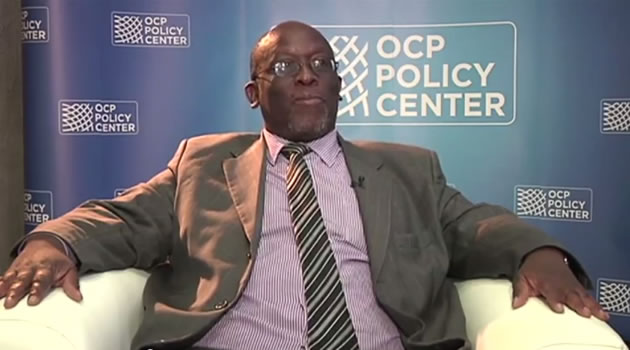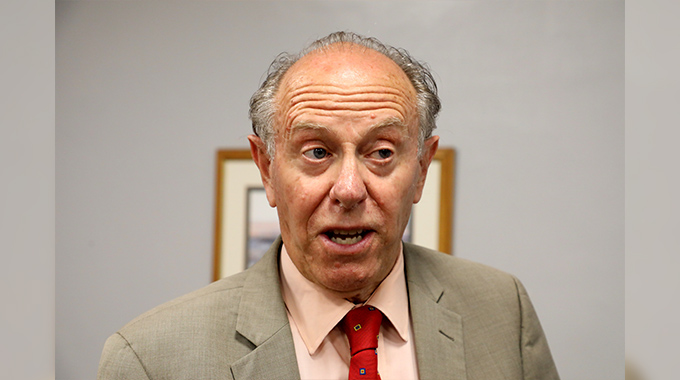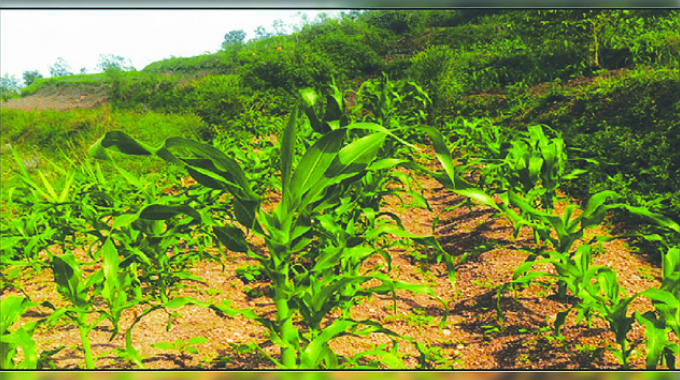Life not getting any better for Tokwe-Mukosi flood victims

 Yoliswa Dube recently in Mwenezi
Yoliswa Dube recently in Mwenezi
NOW they have become like parcels in the “OUT” tray pending delivery to their final postal address.
But these are very hungry and agitated parcels. They just wait; much like waiting for the rain that no one knows of its arrival.
Having been moved from the stench infested and crowded Chingwizi transit camp on Nuanetsi Ranch in Mwenezi, a year down the line, villagers displaced by flooding around the Tokwe-Mukosi dam basin still scantily join together a couple of sticks, plastics and cloths to make bathrooms.
The “shelter-box” — the only home they have known for the past year — is in tatters, worryingly so for many as the rainy season approaches.
While at the transit camp, many could be guaranteed of at least one meal per day — but now settled on their temporary pieces of land, they go for days with only water to keep them alive.
Like parcels which are unaware of their destination or have no privilege of choosing it, the inhabitants of Chingwizi wait to be relocated to what would be their permanent residences where hopefully, they can pick up the pieces and move on with their lives.
But right now, hope is uncertain as they see no silver lining or their poverty coming to an end any time soon.
Their lives are literally at a standstill as the parched soil cannot offer any reprieve neither is there any prospects for irrigation to guarantee agricultural productivity.
“Our children are always crying because they’re not well fed. In fact, they hardly eat. It’s a forced fast. Our children are starving and have only water to drink in order to stay alive. If we’re not given any rations, we’ve no alternative for food, it’s just unbearable,” said Zoda Makozho, a guardian to eight young children.
The pint-sized Makozho, whose eyes welled with tears throughout the interview, said they had no alternative source of income and were forced to rely entirely on the government for the provision of food.
“We can go for as long as three months without receiving any rations and this affects our children the most. I wouldn’t even be complaining if there were other options. We’ve no option but to wait for assistance from the government,” she said as she pulled her two-year-old grandchild who had wandered under the shade of a tree.
Villagers in the Chingwizi section are allocated a 50kg ration of maize regardless of the size of the family.
This allocation is not accompanied by any other groceries and is expected to last for months. Industrious villagers have however started small vegetable gardens where they turn to for relish.
These are watered by the few boreholes drilled in the area as sources of drinking water.
A meal of just isitshwala and vegetables with neither cooking oil nor salt in itself is a luxury — anything beyond that is far beyond their reach.
“They (government) should just provide us with an irrigation facility so that we can at least grow our own food. This is a low rainfall area and with no irrigation, farming is a waste of time,” said a cocky Luckson Magumbadze.
“They’ve just parked us here like cars, we want our compensation. They’d rather let us go back where we came from instead of dumping us here,” he continued.
Before the Tokwe-Mukosi dam basin flooded, Magumbadze said, government officials had assessed their homes to determine how much compensation each villager would get before moving to make room for the construction of the dam but no one ever came back to give feedback until all hell broke loose and the devastating floods changed their lives for the worst.
“I’d rather go back where I came from and move away from this desert. Mai (Shuvai) Mahofa (Minister of State for Masvingo Provincial Affairs) just came here once, promised us heaven on earth and that was it. She never ever came back,” he said, his voice trembling with anger.
With the rainy season approaching, villagers are worried hunger and compensation will not be the last of their problems.
More challenges are yet to mount. The tents villagers inherited from the transit camp are no longer habitable with most exposing them to harsh weather conditions.
“It has rained a couple of times and it has been hell each time. The tents let water in and it’s as good as sitting outside while it rains because they no longer serve their purpose,” said Magumbadze.
This is a worry he shares with many other villagers.
Tamburai Matsigire is also very worried. She was at Nyuni Clinic to seek treatment for a persistent stomach ache when a Chronicle news crew met her.
Matsigire said life had become increasingly hard as they had to worry not only about food and stability but about adequate shelter as well.
“These tents are now like papers, they’re torn and no longer habitable. We’ve been rained on and had to sleep outside before, we still haven’t forgotten about that. We’re worried that as the rainy season approaches, we’ll relive the past once again,” said Matsigire, who sat on the ground with her legs crossed as she waited in a queue to be treated.
She said they had just taken their tents from the transit camp and settled on the temporary pieces of land, awaiting further instructions from government.
“When we were allocated these pieces of land, we were told we could live on them permanently. Later on, we were surprised to learn that these wouldn’t be our permanent homes, we’re yet to be relocated to places such as Lundi, Magudu Range and Masangula,” said Matsigire.
Although some villagers have built huts of mud and sticks to supplement the ragged tents, they have had to pay a handsome price for wood and grass poaching.
“We’ve been caught by farm owners poaching firewood and grass on their premises and have been terrorised for it. If you’re lucky, you’re made to pay $5 per bundle of sticks. Where can I get that much money from? Instead of paying the $5, you’re made to jump around while being flogged,” said Hardlife Chidaushe, an 18-year-old school dropout.
The teenager who was babysitting his three-year-old sister Shelter while their mother had gone to work at a sugar plantation a distance away said he dropped out of school when he was in Form One.
“I’d love to go back to school and realise my dreams but I can’t afford to even think about that. My parents can’t afford to pay my school fees so I’ve no choice but to toil with them inorder to put food on the table,” said Hardlife.
He said he would kill for an opportunity to acquire an education and emancipate his family from the shackles of poverty which oppresses them.
“My mother left yesterday afternoon for a sugar plantation close to Runde River where she went to work for a few dollars. She’ll probably be back late at night because it’s quite a long distance away from here,” said Hardlife.
Little Shelter, who was more than happy to have a picture taken, is too young to understand how desperate the situation is.
But some who understand the desperation perfectly well have turned to music and alcohol to suppress their sorrows.
A nameless bar in Gwavuraya Village which only runs when alcohol is available is quite the popular spot. At around 2pm, a significant number of men had already gathered to drink the seemingly popular 1,25 litre of Chibuku Super which costs $1.
The loud solar powered radio played tunes by gospel musician Mathias Mhere.
Among those gathered at the bar was Taurai Taruvinga who has not let poverty crush his spirit.
He sang his own composition “Madhuve wandinetsa”, as he displayed his nimble footedness much to the delight of those in his company.
“We’ve no money because we’ve no jobs but that won’t stop me from waking up every morning. You can never solve all the problems on this earth so you just have to take each day as it comes,” said Taruvinga.
Chingwizi section has small blue and white tents dotted a few metres apart from each other.
On these small pieces of land, villagers have erected make-shift bathrooms and continue to relieve themselves in nearby bushes.
Various structures have been established in the area with Tokwe-Mukosi Primary School, Nyuni Secondary School and Chingwizi Primary School fully functional.
Chingwizi Clinic, although still under construction has reached near completion.
While development of the area is progressing well, the government intends to move these people further.
Villagers are puzzled why they must continue to move when efforts are being made to develop the area.
They alleged that the structures under construction were not meant for them but for people who will settle in the area as a result of the rumoured establishment of an ethanol plant by a private investor.
While the Provincial Affairs Minister for Masvingo Shuvai Mahofa promised the residents of Chingwizi relocation to about seven different locations, which are more habitable, nothing has been done months after that promise.
“As a ministry responsible for Masvingo, we’ve done our part. We’re now waiting to hear from the Ministry of Lands and Resettlement on the way forward,” said Cde Mahofa.










Comments